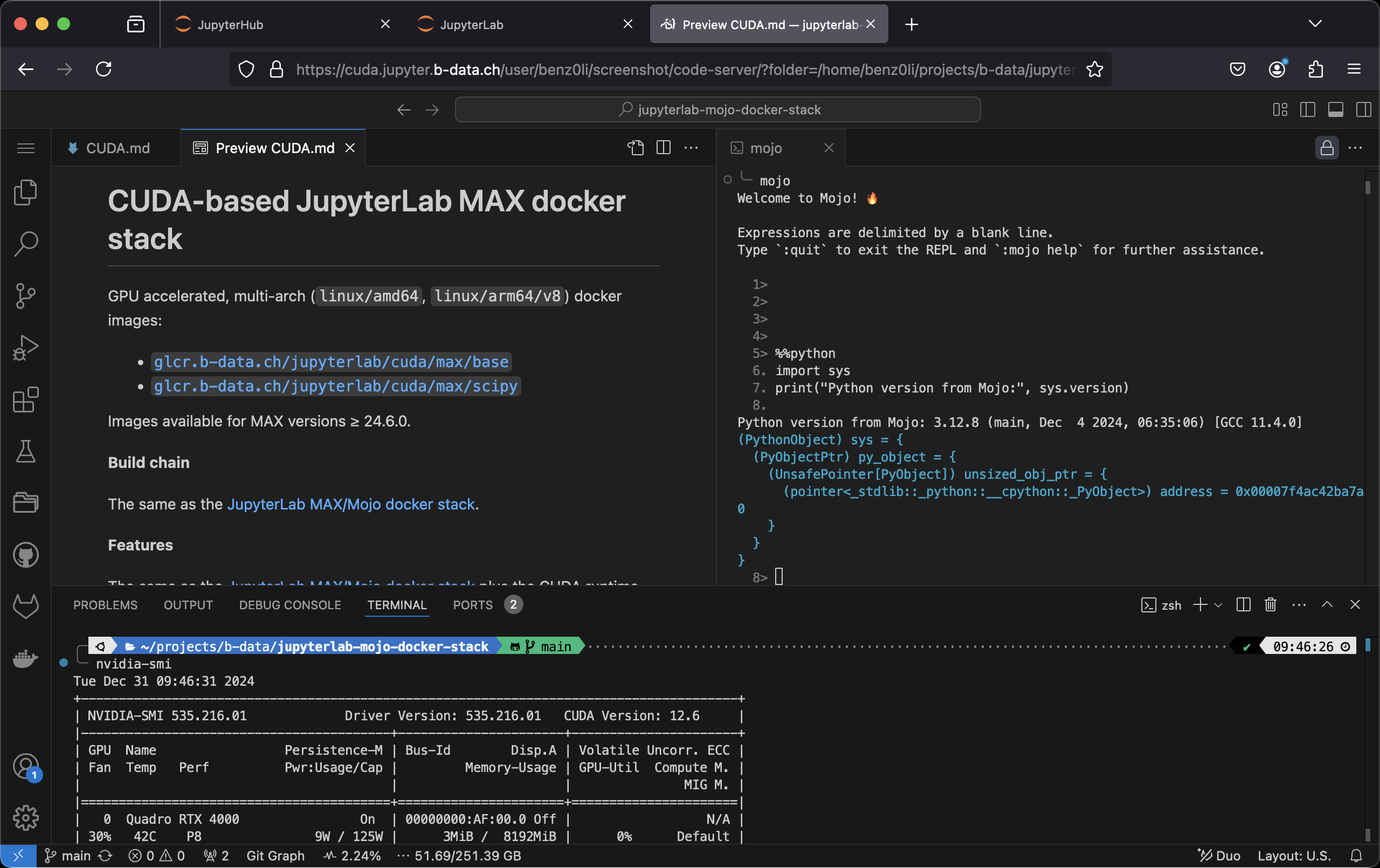# CUDA-based JupyterLab MAX docker stack
GPU accelerated, multi-arch (`linux/amd64`, `linux/arm64/v8`) docker images:
* [`glcr.b-data.ch/jupyterlab/cuda/max/base`](https://gitlab.b-data.ch/jupyterlab/cuda/max/base/container_registry)
* [`glcr.b-data.ch/jupyterlab/cuda/max/scipy`](https://gitlab.b-data.ch/jupyterlab/cuda/max/scipy/container_registry)
Images available for MAX versions ≥ 24.6.0.

**Build chain**
The same as the
[JupyterLab MAX/Mojo docker stack](README.md#jupyterlab-maxmojo-docker-stack).
**Features**
The same as the
[JupyterLab MAX/Mojo docker stack](README.md#jupyterlab-maxmojo-docker-stack)
plus the CUDA runtime.
:point_right: See the [CUDA Version Matrix](CUDA_VERSION_MATRIX.md) for detailed
information.
**Subtags**
The same as the
[JupyterLab MAX/Mojo docker stack](README.md#jupyterlab-maxmojo-docker-stack).
## Table of Contents
* [Prerequisites](#prerequisites)
* [Install](#install)
* [Usage](#usage)
* [Similar project](#similar-project)
## Prerequisites
The same as the
[JupyterLab MAX/Mojo docker stack](README.md#prerequisites) plus
* NVIDIA GPU
* NVIDIA Linux driver
* NVIDIA Container Toolkit
:information_source: The host running the GPU accelerated images only requires
the NVIDIA driver, the CUDA toolkit does not have to be installed.
## Install
To install the NVIDIA Container Toolkit, follow the instructions for your
platform:
* [Installation Guide — NVIDIA Cloud Native Technologies documentation](https://docs.nvidia.com/datacenter/cloud-native/container-toolkit/install-guide.html#supported-platforms)
## Usage
### Build image (base)
*latest*:
```shell
cd base
docker build \
--build-arg BASE_IMAGE=ubuntu \
--build-arg BASE_IMAGE_TAG=22.04 \
--build-arg BUILD_ON_IMAGE=glcr.b-data.ch/cuda/python/ver \
--build-arg MOJO_VERSION=25.1.0 \
--build-arg PYTHON_VERSION=3.12.9 \
--build-arg CUDA_IMAGE_FLAVOR=base \
--build-arg INSTALL_MAX=1 \
-t jupyterlab/cuda/max/base \
-f latest.Dockerfile .
```
*version*:
```shell
cd base
docker build \
--build-arg BASE_IMAGE=ubuntu \
--build-arg BASE_IMAGE_TAG=22.04 \
--build-arg BUILD_ON_IMAGE=glcr.b-data.ch/cuda/python/ver \
--build-arg CUDA_IMAGE_FLAVOR=base \
--build-arg INSTALL_MAX=1 \
-t jupyterlab/cuda/max/base:MAJOR.MINOR.PATCH \
-f MAJOR.MINOR.PATCH.Dockerfile .
```
For `MAJOR.MINOR.PATCH` ≥ `24.6.0`.
### Create home directory
Create an empty directory using docker:
```shell
docker run --rm \
-v "${PWD}/jupyterlab-jovyan":/dummy \
alpine chown 1000:100 /dummy
```
It will be *bind mounted* as the JupyterLab user's home directory and
automatically populated.
### Run container
self built:
```shell
docker run -it --rm \
--gpus '"device=all"' \
-p 8888:8888 \
-u root \
-v "${PWD}/jupyterlab-jovyan":/home/jovyan \
-e NB_UID=$(id -u) \
-e NB_GID=$(id -g) \
jupyterlab/cuda/max/base[:MAJOR.MINOR.PATCH]
```
from the project's GitLab Container Registries:
```shell
docker run -it --rm \
--gpus '"device=all"' \
-p 8888:8888 \
-u root \
-v "${PWD}/jupyterlab-jovyan":/home/jovyan \
-e NB_UID=$(id -u) \
-e NB_GID=$(id -g) \
IMAGE[:MAJOR[.MINOR[.PATCH]]]
```
`IMAGE` being one of
* [`glcr.b-data.ch/jupyterlab/cuda/max/base`](https://gitlab.b-data.ch/jupyterlab/cuda/max/base/container_registry)
* [`glcr.b-data.ch/jupyterlab/cuda/max/scipy`](https://gitlab.b-data.ch/jupyterlab/cuda/max/scipy/container_registry)
The use of the `-v` flag in the command mounts the empty directory on the host
(`${PWD}/jupyterlab-jovyan` in the command) as `/home/jovyan` in the container.
`-e NB_UID=$(id -u) -e NB_GID=$(id -g)` instructs the startup script to switch
the user ID and the primary group ID of `${NB_USER}` to the user and group ID of
the one executing the command.
The server logs appear in the terminal.
#### Using Podman (rootless mode)
Create an empty home directory:
```shell
mkdir "${PWD}/jupyterlab-root"
```
Use the following command to run the container as `root`:
```shell
podman run -it --rm \
--device 'nvidia.com/gpu=all' \
-p 8888:8888 \
-u root \
-v "${PWD}/jupyterlab-root":/home/root \
-e NB_USER=root \
-e NB_UID=0 \
-e NB_GID=0 \
-e NOTEBOOK_ARGS="--allow-root" \
IMAGE[:MAJOR[.MINOR[.PATCH]]]
```
#### Using Docker Desktop
[Creating a home directory](#create-home-directory) *might* not be required.
Also
```shell
docker run -it --rm \
--gpus '"device=all"' \
-p 8888:8888 \
-v "${PWD}/jupyterlab-jovyan":/home/jovyan \
IMAGE[:MAJOR[.MINOR[.PATCH]]]
```
*might* be sufficient.
## Similar project
* [MAX container](https://docs.modular.com/max/container/)
**What makes this project different:**
1. Derived from [`nvidia/cuda:12.8.0-base-ubuntu22.04`](https://hub.docker.com/r/nvidia/cuda/tags?page=1&name=12.8.0-base-ubuntu22.04)
1. IDE: [code-server](https://github.com/coder/code-server) next to
[JupyterLab](https://github.com/jupyterlab/jupyterlab)
1. Just Python – no [Conda](https://github.com/conda/conda) /
[Mamba](https://github.com/mamba-org/mamba)
The CUDA-based JupyterLab MAX docker stack is derived from the CUDA-based Python
docker stack.
:information_source: See also [Python docker stack > Notes on CUDA](https://github.com/b-data/python-docker-stack/blob/main/CUDA_NOTES.md).